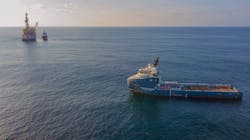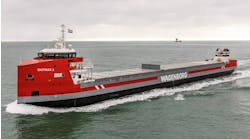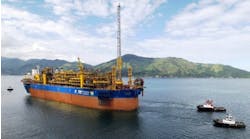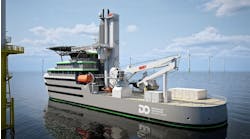Contributed by Tototheo Maritime
Following six years as WISTA International president, Despina Panayiotou Theodosiou suggests that digitalization may prove one of the offshore support vessel sector’s most effective tools in facing the challenges of decarbonization, recruitment and even diversity.
Theodosiou, co-CEO of satellite communications and digital solutions provider Tototheo Maritime, knows about the impact connectivity has on productivity and profitability in offshore operations. However, she also stresses the importance of progressive technology in addressing the industry’s ESG concerns.
In the offshore support sector, the introduction of new technologies is often met with concern over potential job losses, but Theodosiou is quick to allay these fears. “While digitalization is bringing about fundamental changes within the industry, offshore vessels are extremely complex machines, and digitalization will not change that,” she said. “Instead, it provides potential to enhance the operation and management of assets while creating a range of new roles.”
Offshore personnel in transition
Where connectivity needs to reach beyond land-based or LTE networks, recent statistics from Inmarsat show an 83% increase in data usage by offshore vessels over a 12-month period (June 2021–June 2022). Across all parts of the shipping industry, about 70-80% of current data consumption is attributable to crew. This reflects changing expectations of life at sea but also the willingness of seafarers to engage with technology, Theodosiou added.
“Such engagement could easily translate into the digitalization—and data-driven decision-making that optimizes vessel sustainability and allows offshore operators to lead on ESG—rather than being portrayed as only responding under pressure from regulators, investors or wider society,” she said. “Digital solutions that monitor, report and advise on sustainability in a transparent way are also likely to attract the next generation of tech-savvy, environmentally aware talent with the skills needed to drive the offshore support industry forward.”
Increasingly, vessel managers and seafarers alike will need to engage with others in the offshore sector with specialist knowledge in the field of digitalization. According to latest figures from data analytics and consulting firm GlobalData, for example, the number of offshore oil and gas companies recruiting for digitalization-related positions grew by three percentage points between June 2021 and June 2022. Companies in the sector are reported to be hiring for digitalization-based roles at a higher rate than the average across all industries.
Appointed in 2016 as WISTA International president, the immediate past president said she has learned from experience that digitalization is not only creating more jobs but also levelling the playing field for men and women as employees.
“Digital transformation is creating a wide range of roles where both men and women have the opportunity to succeed, and that extends to offshore support vessel operations," she said. "I am not saying that there is any motivation for reducing the campaign for gender equality in offshore; what I am saying is the skillsets and experience required for the industry’s digital age are also transparently gender neutral. The same goes for ethnicity.”
Social mobility in offshore
“The offshore sector is not homogenous; it is a complex and often fragmented industry," she added. "It will always provide plenty of opportunities for specialists, but a digitalized and data-driven approach can create the kind of transparency that attracts the best talent to support a growing part of the industry’s needs.”
An article by McKinsey & Co. recently described how an oil and gas company in Asia focused its digital transformation strategy on “shifting the mindsets of people across the organization and developing new capabilities to support long-term sustainable change.”
As well as hiring new recruits with expertise in data analytics and software development, the company employed specialists to train existing personnel in agile working methods and using new digital tools. It also hosted hackathons to identify potential digital use cases and established a digital center of excellence to develop and implement the most promising concepts that emerged from the sessions.
“We need to be discussing this kind of approach constantly,” Theodosiou said. “The evolution of offshore is a good thing, and we need to make sure our offshore support workforce retrains continuously and has the tools needed to be part of the transition; otherwise, we may fail.”
Far from resisting a higher level of automation, the talent of tomorrow will expect it, she added.
“We are likely to see support vessel crews who are already engaged and accept that automation of some functions, processes or even roles that are mundane is inevitable," Theodosiou said. Digitalization will create a new kind of crew with a more rounded view of a vessel’s operational profile—a crew that expects digital technologies to be integral to performing their roles.”
02.20.2023







